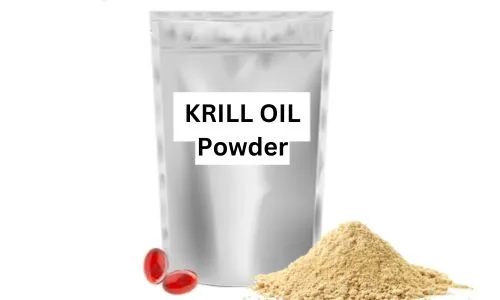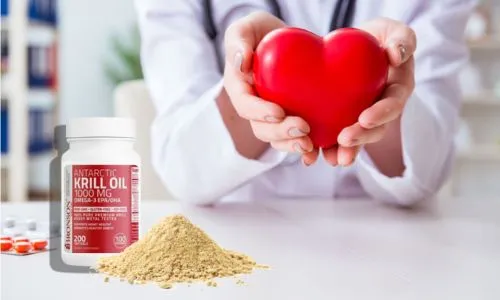Hydrolyzed Krill Protein: A Natural Source of Omega-3
In recent years, the health-conscious community has been abuzz with talk about omega-3 fatty acids and their myriad benefits. While fish oil has long been the go-to source for these essential nutrients, a new player has emerged on the scene: hydrolyzed krill protein. This powerful supplement derived from tiny Antarctic crustaceans is making waves in the nutrition world, offering a unique and potent source of omega-3s. Let's dive deep into the world of hydrolyzed krill protein and discover why it's becoming a preferred choice for health enthusiasts worldwide.

Why Omega-3 from Hydrolyzed Krill Protein is Superior?
Hydrolyzed krill protein is not just another omega-3 supplement; it's a game-changer in the world of nutrition. Unlike traditional fish oil, krill-derived omega-3s come in a phospholipid form, which is more easily absorbed by the body. This enhanced bioavailability means that you get more bang for your buck, with a higher percentage of the omega-3s actually being utilized by your cells.
Moreover, krill oil is rich in astaxanthin, a potent antioxidant that gives krill its distinctive red color. This compound not only helps preserve the omega-3s, preventing them from oxidizing, but also offers additional health benefits of its own. The synergistic effect of omega-3s and astaxanthin in hydrolyzed krill protein creates a powerhouse supplement that outperforms many other sources of these essential fatty acids. Another advantage of hydrolyzed krill protein is its sustainability. Krill are one of the most abundant species on the planet, and their harvesting is strictly regulated to ensure minimal environmental impact. This makes krill oil a more eco-friendly choice compared to some overfished sources of omega-3s.

Hydrolyzed Krill Protein for Skin Health
The benefits of hydrolyzed krill protein extend beyond internal health; it's also a boon for your skin. The omega-3 fatty acids in krill oil, particularly EPA and DHA, play a crucial role in maintaining skin health and appearance. These fatty acids are integral components of cell membranes, helping to keep skin supple, hydrated, and resilient. Research has shown that omega-3s can help reduce inflammation in the skin, which is beneficial for those suffering from conditions like acne, psoriasis, and eczema. The anti-inflammatory properties of krill-derived omega-3s can help soothe irritated skin and promote a clearer, more even complexion.
Furthermore, the astaxanthin in hydrolyzed krill protein acts as a powerful antioxidant, protecting the skin from free radical damage caused by UV radiation and environmental pollutants. This can help prevent premature aging, reduce the appearance of fine lines and wrinkles, and promote a more youthful, radiant complexion. The unique phospholipid structure of krill-derived omega-3s also enhances their ability to penetrate skin cells, delivering these beneficial nutrients where they're needed most. This makes hydrolyzed krill protein an excellent choice for those looking to improve their skin health from the inside out.

Hydrolyzed Krill Protein and Its Role in Heart Health
One of the most well-known benefits of omega-3 fatty acids is their positive impact on cardiovascular health, and hydrolyzed krill protein is no exception. The EPA and DHA found in krill oil have been shown to support healthy heart function in numerous ways. Studies have demonstrated that regular consumption of krill-derived omega-3s can help maintain healthy cholesterol levels. Specifically, they may help increase HDL (good) cholesterol while reducing LDL (bad) cholesterol and triglycerides. This lipid-balancing effect can contribute to overall heart health and reduce the risk of cardiovascular diseases.
Moreover, the omega-3s in hydrolyzed krill protein have anti-inflammatory properties that can help reduce inflammation in the blood vessels. Chronic inflammation is a key factor in the development of heart disease, so managing it through diet and supplementation can be a crucial step in maintaining cardiovascular health. The phospholipid form of omega-3s in krill oil may also offer advantages for heart health. Some research suggests that these phospholipids can help improve the function of the endothelium, the inner lining of blood vessels. A healthy endothelium is essential for proper blood flow and pressure regulation, further supporting overall cardiovascular health.
Additionally, the astaxanthin in hydrolyzed krill protein adds another layer of heart protection. This potent antioxidant has been shown to have anti-inflammatory effects and may help reduce oxidative stress in the cardiovascular system, potentially lowering the risk of heart disease.

Conclusion
Hydrolyzed krill protein stands out as a superior source of omega-3 fatty acids, offering unique benefits for overall health, skin vitality, and heart function. Its high bioavailability, coupled with the added benefits of astaxanthin, makes it a compelling choice for those looking to optimize their omega-3 intake.
As we continue to uncover the myriad benefits of this marine treasure, it's clear that hydrolyzed krill protein has earned its place in the pantheon of superfoods. Whether you're looking to support your heart health, improve your skin's appearance, or simply ensure you're getting the most from your omega-3 supplement, hydrolyzed krill protein offers a powerful, natural solution. For more information about hydrolyzed krill protein and other natural plant extracts, please contact us at info@yanggebiotech.com. Our team of experts is ready to help you discover the perfect nutritional solutions for your needs.
References
1. Ulven, S. M., & Holven, K. B. (2015). Comparison of bioavailability of krill oil versus fish oil and health effect. Vascular Health and Risk Management, 11, 511-524.
2. Bunea, R., El Farrah, K., & Deutsch, L. (2004). Evaluation of the effects of Neptune Krill Oil on the clinical course of hyperlipidemia. Alternative Medicine Review, 9(4), 420-428.
3. Schuchardt, J. P., Schneider, I., Meyer, H., Neubronner, J., von Schacky, C., & Hahn, A. (2011). Incorporation of EPA and DHA into plasma phospholipids in response to different omega-3 fatty acid formulations--a comparative bioavailability study of fish oil vs. krill oil. Lipids in Health and Disease, 10, 145.
4. Tou, J. C., Jaczynski, J., & Chen, Y. C. (2007). Krill for human consumption: nutritional value and potential health benefits. Nutrition Reviews, 65(2), 63-77.
5. Berge, K., Musa-Veloso, K., Harwood, M., Hoem, N., & Burri, L. (2014). Krill oil supplementation lowers serum triglycerides without increasing low-density lipoprotein cholesterol in adults with borderline high or high triglyceride levels. Nutrition Research, 34(2), 126-133.

Based on your location and order quantity, you will have the opportunity to receive a limited time free shipping promotion!

Who we are


